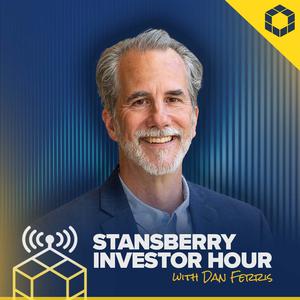
Stansberry Investor Hour
Stansberry Research
Hosted by Dan Ferris
- 1 hour 4 minutesBitcoin Is Headed for a Bubble This Year
On this week's Stansberry Investor Hour, Dan and Corey welcome their colleague Eric Wade back to the show. Eric is the editor of Crypto Capital and Stansberry Innovations Report here at Stansberry Research. He returns to the podcast to talk all about crypto – from the bitcoin bubble he expects to happen this year to two free crypto recommendations.
Eric kicks off the show by explaining the four-year bitcoin cycle. He breaks down how bitcoin halvings fit into it and its four one-year parts – crash, accumulation, growth, and bubble. He also covers how this cycle has played out in the past, optimism fueled by Donald Trump's presidential win, the possibility of a U.S. Bitcoin Strategic Reserve, tailwinds for further crypto adoption, and several indicators to help you spot the top of the next bitcoin bubble. However, he warns listeners to temper their expectations for gains this year. (1:46)
Next, Eric discusses the exciting world of "altcoins," i.e., cryptos other than bitcoin. These altcoins can range from silly (such as meme coins like Fartcoin) to incredibly useful (solving real-world problems). In Crypto Capital, Eric and his team are focused on finding the latter – "projects that are established yet phenomenally undervalued." If you're a bitcoin skeptic, Eric urges you to give altcoins a chance. (24:34)
Finally, Eric lists off two altcoins that he likes today. The first one is up more than 700% in the Crypto Capital portfolio, and he believes it will continue doing really well. And the second altcoin has been largely hated ever since it collapsed 90%-plus. But Eric and his team believe it could soar 10 times over the next two years and eventually challenge heavyweights Solana and Ethereum, as its "superior" blockchain technology is different from anything else out there. (40:30)
21 January 2025, 10:02 pm - 1 hour 7 minutesThis System Turned $1,000 Into $250,000
On this week's Stansberry Investor Hour, Dan and Corey welcome Keith Kaplan back to the show. Keith is the CEO of our corporate affiliate TradeSmith. And he's excited to share a breakthrough technology that he and his team have worked tirelessly to develop...
Keith kicks off the show by discussing how you can use TradeSmith's new software to leverage stocks and short-term moves in order to generate income. It involves understanding both market seasonality and an individual stock's seasonality. Keith uses Tesla as an example and breaks down how he made 50% short-term gains just from reviewing past data trends. He notes that TradeSmith's data gets updated constantly, so if patterns change, users will know. After running 2.2 quintillion market tests, the TradeSmith team found the most optimal seasonality periods for 5,000 individual stocks and funds. And the numbers speak for themselves, with an 82.8% win rate and median gains of 6% over 15 trading days. (1:51)
Next, Keith goes further in depth about how the system works – including sending entry and exit alerts for each position – and how human biases come into play. He emphasizes that this tool is made for investors all across the interaction spectrum... So you can have TradeSmith fish for you and tell you which stocks to buy, or you can do the fishing yourself and use the system to research stocks, or a combination of the two. Keith also explores how TradeSmith's team looks at past cyclical patterns to select the best stocks. (21:16)
Finally, Keith shares how the algorithm works for options trading. In testing, it turned $1,000 into $250,000 over 16 years. Keith urges listeners to try the system with conservative position sizing and see for themselves the stellar results they'll get. It's all available in the Trade Cycles newsletter by TradeSmith. And as Keith hammers home, this technology is very advanced. Since no two stocks or funds are the same, no two algorithms end up being the same for them. (37:56)
13 January 2025, 9:42 pm - 54 minutes 19 secondsThe Top 10 Potential Surprises for 2025
On this week's Stansberry Investor Hour, Dan and Corey share their annual list of Top 10 Potential Surprises for the new year. As Dan clarifies from the outset, these are NOT predictions. They're simply things that would surprise investors in 2025 if they happened.
We won't spoil the surprises. But just to give you an idea, you'll hear about everything from bitcoin to Elon Musk's Department of Government Efficiency to a possible Stansberry Research mayor.
Even if Dan and Corey's surprises don't come about this year, this exercise is a reminder for investors to keep their minds open and to consider a broad range of outcomes.
Surprise No. 1: 1:51Surprise No. 2: 5:43Surprise No. 3: 10:59Surprise No. 4: 17:11Surprise No. 5: 21:25Surprise No. 6: 26:06Surprise No. 7: 29:28Surprise No. 8: 33:04Surprise No. 9: 36:26Surprise No. 10: 41:31
7 January 2025, 9:07 pm - 1 hour 3 minutesGunslinging Gambler or Cautious Investor: Which One Are You?
On this week's Stansberry Investor Hour, Dan and Corey welcome Herb Greenberg back to the show. Herb started out as a financial journalist and now publishes On the Street, a newsletter that offers observations, insights, and opinions on various stocks and the broad market. Herb has spent 50 years researching and writing about the markets, and he joins the podcast to impart some of his wisdom.
Herb starts off by reintroducing himself, his opinions on market risk, and his history with long-biased research. He emphasizes that knowing yourself, your psychological makeup, and your skill set are crucial components to success. Some investors thrive under the pressure and enjoy the gambling nature of stocks, while others prefer to sleep well at night and take a more cautious, long-term approach. Either route is OK. And the same principle applies to specifics like when to sell a stock... "There's no one size fits all," Herb says. But the upside to every mistake is that you'll quickly learn more about yourself. (1:22)
Next, Herb discusses a recent post in his On the Street newsletter about home-furnishings company RH. Not long ago, RH's CEO made comments concerning debt that raised many red flags. This leads to a conversation about software company MicroStrategy, which has been using debt to buy bitcoin. "It's a pyramid atop a pyramid," Herb quips. He also shares his thoughts on bitcoin itself, talks about the 2021 market mania where "everyone was a bag holder," and dives into how retail and institutional investors differ in risk versus reward. (19:27)
Finally, Herb evaluates today's market optimism and the potential for an inflection point. He notes that many garbage stocks have gone from deep in the red to in the green this year for no reason other than hype. Herb then urges investors not to get complacent with their portfolio holdings and to always consider differing opinions on stocks, in case the setup has changed since you first bought in. "You lose sight of the ones that have not been problem children." Herb rounds things out with a discussion about short selling and market inefficiencies created by passive investing. (38:29)
30 December 2024, 9:30 pm - 1 hour 8 minutesThe Critics Are Wrong... Copper Demand Is Here to Stay
On this week's Stansberry Investor Hour, Dan and Corey welcome Brian Dalton back to the show. Brian is president and CEO of Altius Minerals, a diversified mining royalty and streaming company operating in Canada, the U.S., and Brazil.
Brian kicks things off by sharing the basics of Altius Minerals – what the company does, what sets it apart from other natural resource royalty companies, and the option value of its assets. He also talks a bit about his background and how he got his start in prospecting. (1:21)
Next, Brian explores the renewable-energy part of the business. Altius took its coal revenues and reinvested those to write royalties on renewable-energy projects, particularly wind and solar. As Brian explains, nearly all of these projects have some aspect involving energy storage. And best of all, renewable energy's resource life is basically "infinite." (15:53)
Then, Brian delves into copper. He urges listeners to ignore all of the noise around the metal – from both the "woke" and "antiwoke" sides of the aisle – and to realize that demand is steadily rising. In the short term, he says that investors can really take advantage of volatility and the irrationality of price cycles. But there's also a lot of money to be made long term, as demand isn't going anywhere. "Copper is electricity," Brian notes. Further, he discusses incentivization prices, operating costs, and the future of the industry. (28:59)
Finally, Brian talks about nuclear energy's prospects, Altius' history with uranium royalties, and how he makes decisions about Altius' capital allocation. Unlike many other companies, Altius treats share buybacks as if they're competing against external investment opportunities. If the best value in the market is in the assets Altius already owns, and if there's a wide spread between that value and the share price, only then do buybacks happen. (44:50)
23 December 2024, 9:30 pm - 1 hour 8 secondsYou Can Make a Killing With Legal Monopolies Like Nvidia
On this week's Stansberry Investor Hour, Dan and Corey are joined by Louis Navellier. Louis is a growth investor with more than 40 years of experience in the markets. His Growth Investor newsletter at our corporate affiliate InvestorPlace is catered toward individual investors. It helps give these folks an easy-to-understand look at current market trends and opportunities.
Louis kicks things off by sharing how he got his start in finance, how he learned about "anomalies and efficiencies" in the market, and why he dislikes banking stocks. He predicts that the implosion of private credit is going to be the next black-swan event to upset the markets. With 11% yields, private credit simply isn't sustainable. Louis also discusses what changes President-elect Donald Trump will have to make for prosperity to rise, as well as what's happening in Ukraine. (1:14)
Next, Louis touches on the market narrowing, describes which metrics his stock-grading system factors in, lists off several growth stocks he likes today, and reviews many legal monopolies he has profited from. One such name is chipmaker Nvidia, which Louis says he'll "be holding through the end of the decade." After that, he talks about why he's bullish on natural gas, how he spots legal monopolies in the first place, and the Biden administration's hostility toward tech. (18:55)
Finally, Louis shares how he decides when to cut a stock loose and gives his take on nuclear energy. When it comes to his investing philosophy, he notes, "I only buy things when they earn money." And Louis closes with his reasoning for not buying utility stocks. (38:22)
16 December 2024, 8:44 pm - 1 hour 3 minutesREITs Aren't Dead – Don't Believe the Negative Sentiment
On this week's Stansberry Investor Hour, Dan and Corey welcome Brad Thomas to the show. Brad is the founder of our corporate affiliate Wide Moat Research. There, he serves as editor for the Wide Moat Daily, The Wide Moat Letter, the Intelligent Options Advisor, and the High-Yield Advisor newsletters. Brad joins the podcast to share some of his three decades' worth of experience in real estate.
Brad kicks things off by describing his background in real estate, how he lost almost everything during the Great Recession, and how his experience helps him with his job today researching companies. Next, Brad debunks the three largest perceived overhangs for real estate investment trusts ("REITs"): debt maturities, rising rates, and the "dead" office sector. As he explains, they aren't as big of factors for equity REITs as many believe. And in particular, there are some gems that investors can find within the office sector. (1:47)
Next, Brad talks about the growth potential for many specific REIT sectors, including cannabis, cell towers, data centers, and casinos. He throws out a few stock names along the way, and also explains what influence technology has had on REITs and their operations. This leads Brad to share his "trifecta approach" for diversifying between the three main beneficiaries of technology advancements. And he gives several reasons why investors should even bother to get into REITs right now, from valuations to Donald Trump. (18:49)
Finally, Brad points out that most companies have real estate components. So understanding how business is created from the ground up gives him and his team at Wide Moat Research an advantage. He emphasizes that Wide Moat's main goals are principal preservation and finding "sleep well at night" stocks. Brad then finishes by sharing which sectors outside of real estate he finds most attractive today. (41:17)
9 December 2024, 9:51 pm - 1 hour 2 minutesWhy a Long-Term Investment Focus Makes All the Difference
On this week's Stansberry Investor Hour, Dan and Corey are joined by Matt Franz. Matt is founder and principal of Eagle Point Capital. The registered investment adviser aims to build wealth in the long term while avoiding the permanent loss of capital.
Matt kicks off the show by describing Eagle Point Capital's ownership mentality for buying stocks and what qualities he looks for in a company. As he explains, businesses that have very simple unit economics and that are noncyclical tend to be the best. He also zeroes in on specific metrics to evaluate stocks, the importance of owning businesses that reinvest capital, and his "replication mode" method for assessing a company's future potential. (1:41)
Next, Matt talks about whether brands can be economic moats. He urges investors not to conflate brand awareness with pricing power, using consumer-electronics company Toshiba as an example. This leads to a conversation about luxury brands, why Matt prefers distributors to retailers, and why he only invests in companies worth 10 times earnings or less. Matt then breaks down his long-term focus, discussing intrinsic value and giving listeners a reality check. (17:10)
Finally, Matt highlights the discipline it takes to be a long-term value investor, as it's human nature to want to add more to a position when it's soaring or sell shares on bad news. However, when you own good businesses, it's best to sit on your hands and do nothing. Matt also shares some guidelines Eagle Point Capital follows when searching for stocks in terms of market cap, industry, risk factor, and cyclicality. (37:53)
2 December 2024, 9:53 pm - 59 minutes 32 secondsFrom Real Estate to Crypto, Value-Investing Opportunities Are Everywhere
On this week's Stansberry Investor Hour, Dan and Corey welcome Andrew Walker to the show. Andrew is a portfolio manager at value-oriented hedge fund Rangeley Capital and author of Yet Another Value Blog. He focuses on microcap, deep-value, and special-situations investments.
Andrew kicks off the show by sharing how he got his start as an investor and what inspired him to focus on value investing. He says that while value investing has gotten more competitive over the years, investors can still do well in this space if they think outside of the box. Andrew also discusses his renewed interest in special purpose acquisition companies ("SPACs") and whether de-SPACs are worth wading through for winners. (1:47)
Next, Andrew names a couple of companies he invested in and gives his reasoning for each play. The first is a bitcoin miner that emerged from bankruptcy. As Andrew explains, there are a multitude of problems with bitcoin mining, but this miner has managed to curtail some of those and stand out from the pack with its integration of AI. Andrew also talks about the revival of spinoffs, including one particular real estate investment trust that he likes thanks to its huge margin of safety. (15:43)
Finally, Andrew discusses another spinoff he has invested in – a company that owns prime real estate in Manhattan. It has a lot of cash and no debt on its balance sheet. And with legendary investor Bill Ackman's hedge fund owning nearly 40% of the company, Andrew believes there's much more upside ahead and that a turnaround is likely. (38:39)
25 November 2024, 9:41 pm - 1 hour 8 minutesDon't Fear Generative AI – Invest In It
On this week's Stansberry Investor Hour, Dan and Corey are joined by Dr. John Sviokla. John is an author, executive fellow at Harvard Business School, and co-founder of GAI Insights – the world's leading generative artificial-intelligence ("AI") analyst firm. He joins the podcast to talk all things AI – its investing potential, limitations, and real-world applications.
John kicks off the show by explaining how GAI Insights is helping organizations and communities understand and use generative AI. Currently, many executives don't know enough about it to even recognize its opportunities in the workplace. John says that workers whose jobs involve words, images, numbers, and sounds will be the most impacted by this technology. He also breaks down the three new forms of capital: network, behavioral, and cognitive. When it comes to the latter, businesses are trying to protect their proprietary data and processes today by keeping their AI behind firewalls. (1:46)
Next, John talks about how these AI models are trained, the process of training workers to use AI, and the limitations of AI. One such area AI struggles with is creating new ways to look at a problem. However, it's surprisingly good at empathizing and mimicking human emotions. John then discusses AI's computability, the transformer algorithm, and how AI could impact the broad market. (19:11)
Finally, John describes the four levels of generative-AI adoption. Those in the top level – "intelligence leveragers" – drive value by using AI to build AI. Right now, technology is the only industry with these kinds of companies. But John says that in the next five to seven years, each major industry will have an intelligence leverager. This presents a huge opportunity for investors. John gives several real-world situations across different industries (like pharmaceuticals and financials) where AI implementation will be game-changing. (40:35)
18 November 2024, 9:04 pm - 53 minutes 56 secondsThe Overvalued Junk-Bond Market Still Has Pockets of Opportunity
On this week's Stansberry Investor Hour, Dan and Corey welcome Martin "Marty" Fridson back to the show. Marty is an author and expert in the field of high-yield bond investing. He is also a senior analyst at Porter & Co.'s Distressed Investing newsletter.
Marty kicks off the show by discussing the top-down view of the high-yield market. He comments that right now, there is a very small risk premium. Marty breaks down the factors that he uses in his model of fair value and concludes that the high-yield market is extremely overvalued. At the same time, the market is forecasting a higher default rate than credit- ratings agency Moody's. Marty also gives his opinion on whether we'll see a recession, what it means that the inverted yield curve has not yet resulted in a recession, and why he's less critical of the Federal Reserve than other investors. (1:39)
Next, Marty explains that the current situation of the federal-funds rate and the 10-year U.S. Treasury yield moving in opposite directions is not rare. He says it happens 40% of the time. This segues to a discussion about what's happening with the junk-bond market... including companies potentially having to roll over their debt to higher rates... and private credit lenders now competing with high-yield bond buyers. Marty then names which sectors present attractive buying opportunities today. (18:03)
Finally, Marty goes further in depth about his quantitative model and what data it draws upon to find attractively priced distressed debt. He then explains that because high-yield bonds aren't very liquid, exchange-traded funds centered around these investments tend to have a lot of variance in performance. This can have serious consequences in times of extreme market disruption. (34:12)
11 November 2024, 10:17 pm - More Episodes? Get the App
Your feedback is valuable to us. Should you encounter any bugs, glitches, lack of functionality or other problems, please email us on [email protected] or join Moon.FM Telegram Group where you can talk directly to the dev team who are happy to answer any queries.
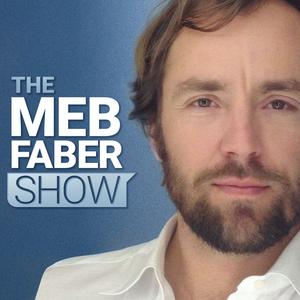 The Meb Faber Show - Better Investing
The Meb Faber Show - Better Investing
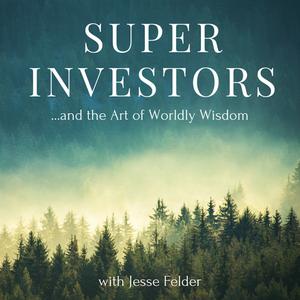 Superinvestors and the Art of Worldly Wisdom
Superinvestors and the Art of Worldly Wisdom
 Palisades Gold Radio
Palisades Gold Radio
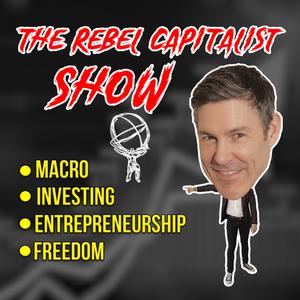 The Rebel Capitalist Show
The Rebel Capitalist Show
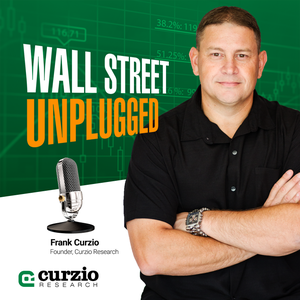 Wall Street Unplugged - Your Best Source for Finance, Investing & Economics
Wall Street Unplugged - Your Best Source for Finance, Investing & Economics
 Sprott Money News
Sprott Money News